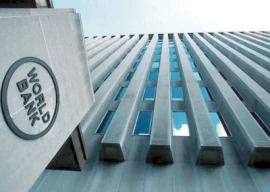
Interior ministry spokesman Siddiq Siddiqi said 13 people were also wounded when the bomber blew himself up in the southern city of Kandahar, where cabinet ministers visiting from the capital Kabul had been in attendance.
The bombing again raises the prospect of renewed instability in Kandahar, one of Afghanistan's bloodiest battlegrounds and the birthplace of the Taliban, in the power vacuum created by the death of powerbroker Ahmed Wali Karzai.
The head of the religious council for the southern province of Kandahar, Hikmatullah Hikmat, was among those killed Thursday, the government said.
An AFP reporter saw the government delegation rapidly evacuated after the attack in two Afghan army helicopters.
"It was a suicide attack. Four people have been martyred and 13 injured. The dead include Maulavi Hikmatullah, head of the Kandahar Ulema council," said Siddiqi, referring to the dead man by his religious title.
"The bombing was in a corner of the mosque. It's a big mosque," he said, adding that it was the venue for a service in memory of Wali Karzai, the younger half-brother of President Hamid Karzai shot dead at home on Tuesday.
A member of the Kandahar provincial council who attended the prayers confirmed it was a suicide bombing inside the mosque.
"I saw one dead and four injured in there. The service was about to end when it happened," Agha Lalai said.
One member of parliament who had attended the service said the government delegation included the ministers of defence, justice and public works, as well as deputy ministers of various ministries and 15 MPs.
After the attack, other high-ranking officials were whisked away in bullet-proof cars and police quickly sealed off the area, an AFP reporter said.
Family members and friends crowded round the mosque and the Mirwais hospital nearby, where casualties had been taken.
Officials said no one in the government party was hurt.
"We'd left the mosque to go to a hall nearby for lunch. The government delegation left (the mosque) 10 minutes before the explosion," said lawmaker Kamal Naser.
Wali Karzai was buried by the president at a funeral which drew thousands of mourners in Kandahar on Wednesday, after he was shot dead in his study by a close friend and the commander of his personal protection force.
Memorial services were to be held for several days at the city's mosques.
Thursday's attack came as the United Nations announced that the number of civilians killed in the Afghan war in the first half of 2011 rose 15 percent, putting the year on track to be the deadliest in a decade.
The disturbing rise in deaths came after the United States sent thousands of extra troops into Afghanistan and said levels of violence in the 2011 fighting season would be an indication of the extent to which it had worked.
The annual mid-year report by the UN mission in the country said insurgents accounted for 80 percent of all deaths and that NATO troops were responsible for 14 percent of killings, with half of all casualties caused by bomb attacks.
"A shift in the tactics of anti-government elements increased the severity of (their) attacks on Afghan civilians," the country's UN human rights director Georgette Gagnon told a press conference in Kabul.
"We saw the trend going the wrong direction."
The report said heightened conflict in the traditional fighting areas in the south and southeast, and the spread of the insurgency to parts of the west and north, meant "civilians experienced a downward spiral in protection."
COMMENTS (3)
Comments are moderated and generally will be posted if they are on-topic and not abusive.
For more information, please see our Comments FAQ









1732792223-0/Untitled-design-(8)1732792223-0-270x192.webp)
1732793281-0/Untitled-design-(9)1732793281-0-270x192.webp)






He was one of the corrupt man in Afghanistan says some analysts.
@Fida Khan: That is not true. All of Pakistan is paying a huge price for the events in Afghanistan for the last over 30 years. Literally hundreds of thousands or more Afghanis are settled in Karachi, not as refugees, but as residents. I personally know scores of them conducting businesses, attending schools, and using all the public infrastructure facilities like water, electricity, gas, etc. In addition the exponentially high rise in crime, drug trafficking, and weapons proliferation has literally devastated the urban sprawl. The double edge sword is that the political upheaval in KPK and areas of Balochistan has also caused the shifting of population to major cities, again putting a burden on an already deteriorating situation. So, while it is true that the Pakhtoons are paying a huge price for the Afghanistan situation, other communities are also almost equally affected.
Only pukhtoons paying the big price in Afghanistans affiars .Ironically we are digging each others graves ; but for how longgggggggggggg